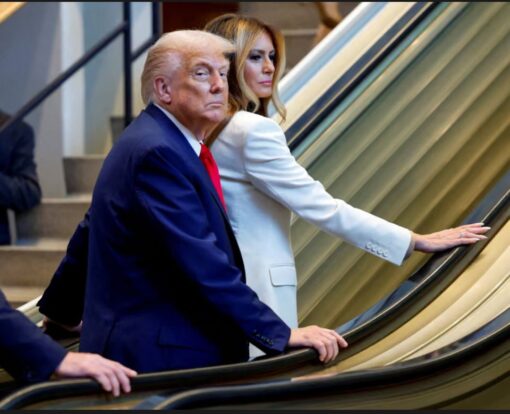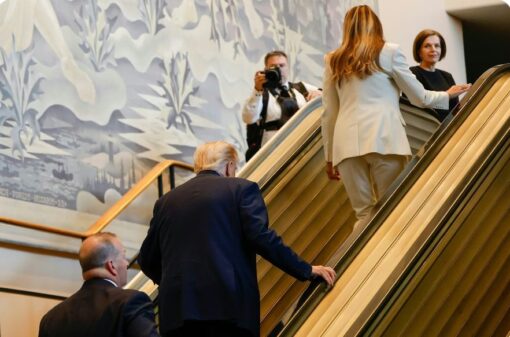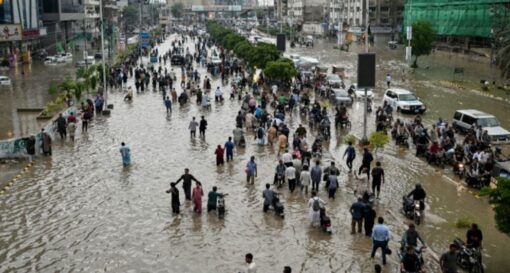United States President Donald Trump has reignited tensions with the United Nations after demanding an official investigation into what he has called “triple sabotage” during his address at the 80th U.N. General Assembly in New York.
Trump alleged that a series of malfunctions — an escalator stoppage, a teleprompter blackout, and audio failures — were not mere accidents but deliberate attempts to embarrass him and compromise his appearance on the world stage.
The claims have triggered a political storm, with the U.S. Secret Service already involved and United Nations officials strongly denying the allegations.
The first incident occurred as Trump and First Lady Melania Trump made their way into the assembly hall. The pair had just stepped onto an escalator when it suddenly came to a halt, forcing them to climb the motionless stairs to reach the second floor.

Trump later said that it was “amazing” that they had not fallen forward, explaining that both he and the First Lady narrowly avoided injury by tightly gripping the handrails.
He described the malfunction as a “sinister event” and declared that it was “absolutely sabotage,” citing a report from the Sunday Times which claimed that some U.N. staff had previously joked about shutting off escalators to humiliate him.
He wrote on his social media platform, “the people that did it should be arrested!” and warned that security footage of the incident must be preserved for further examination.
The second episode involved his teleprompter, which Trump said went “stone cold dark” for nearly fifteen minutes during his speech. The malfunction forced him to abandon his prepared text and deliver parts of his remarks off the cuff.
Trump claimed the blackout was too convenient to be a simple glitch and pointed to it as further evidence of sabotage. During the speech itself, he made light of the issue, joking about his “bad” teleprompter, but his tone shifted the next day when he publicly described the failure as part of a larger pattern of interference designed to undermine him.
The third and final problem Trump cited involved the audio system in the General Assembly hall. According to him, the microphones and speakers were not functioning, and world leaders were only able to hear his remarks through interpreter earpieces.
He said that even Melania could not hear his speech properly and told him afterward, “I couldn’t hear a word.” Trump concluded that this too was part of a deliberate attempt to sabotage his moment on the global stage, accusing the U.N. of gross negligence if not outright hostility.
The President’s complaints have not been confined to social media posts. He announced that he had sent a letter directly to Secretary-General António Guterres, urging a formal investigation into the incidents. He also confirmed that the U.S. Secret Service was reviewing the matter and already looking into what he described as “three very sinister events.”
White House Press Secretary Karoline Leavitt reinforced his position, saying that if any individuals were responsible for intentional disruptions, they “need to be fired and investigated immediately.”
Mike Waltz, the U.S. Ambassador to the United Nations, echoed Trump’s demand for accountability, calling the episodes “unacceptable” and accusing the institution of posing “serious safety and security risks.”
United Nations officials, however, have offered sharply different explanations. On the escalator incident, U.N. spokesperson Stéphane Dujarric said technical readouts from the escalator’s central processing unit indicated that its built-in safety system had triggered automatically.
The stop occurred at the top “comb step” after a videographer from Trump’s own delegation, who had been walking backward to film the President’s entry, accidentally activated the emergency mechanism.
According to Dujarric, the safety system is designed to halt the escalator instantly if something risks being caught, thereby preventing injury. Once Trump’s delegation moved off the escalator, technicians reset the system and restored normal function.
On the teleprompter blackout, U.N. officials stressed that the equipment was not their responsibility. Farhan Aziz Haq, another spokesperson, explained that the teleprompter was brought and operated by Trump’s team, not the U.N. Secretariat.
He directed all inquiries about the malfunction to the White House, insisting the U.N. had no role in its operation or failure. General Assembly President Annalena Baerbock also noted that the teleprompters provided by the U.N. itself had been functioning correctly throughout.
As for the alleged audio problems, U.N. officials said there was no evidence of a systemwide failure. Delegates at the assembly customarily rely on interpreter earpieces, even when speeches are delivered in English, because the devices ensure clear sound and simultaneous translation.
According to the U.N., the audio system functioned normally during Trump’s address, and any perception of a failure may have stemmed from a misunderstanding rather than a malfunction.
The controversy has also highlighted the financial and logistical strains the U.N. faces. Reports indicate that the organization has intermittently shut down some escalators and elevators to cut costs, given budget shortfalls caused by delayed or insufficient contributions from member states, including the United States itself.
However, U.N. officials insist that Tuesday’s escalator stoppage was not part of these conservation measures but a routine safety response.
Despite the U.N.’s explanations, Trump has maintained his stance. He insists the incidents were not coincidental but coordinated acts aimed at undermining him and by extension the United States.
His supporters have echoed this framing, portraying the technical failures as symbolic of a broader institutional bias against America. Opponents, meanwhile, have dismissed the claims as exaggerations or misrepresentations, noting that escalator malfunctions and equipment glitches are not unusual in such a complex facility.

The episode underscores broader tensions between Trump and the United Nations, which have flared repeatedly during his presidency. Trump has long accused the organization of inefficiency, bias, and waste, and has repeatedly threatened to cut U.S. funding.
The “triple sabotage” narrative has provided him with a new rallying point against the international body, allowing him to reinforce his message of American sovereignty and distrust of global institutions.
From a security standpoint, however, the allegations are not being ignored. The involvement of the Secret Service suggests that investigators will conduct a thorough forensic review of the incidents, including escalator logs, audio recordings, and video surveillance footage.
While U.N. officials have welcomed transparency, they remain firm that the events were accidents or the responsibility of Trump’s own technical team.
Regardless of the outcome, the matter has already become a political flashpoint. For Trump’s base, the claim of “sabotage” feeds into long-standing narratives of institutional hostility and elite conspiracy.
For his critics, it highlights his tendency to transform technical mishaps into personal grievances. For the U.N., the controversy risks further eroding its credibility at a time when it is already struggling with divisions among member states and accusations of ineffectiveness.
Whether the investigation confirms deliberate sabotage, operational errors, or simple bad luck, the incident has drawn global attention and intensified scrutiny of the relationship between the U.S. and the United Nations.
What might otherwise have been written off as technical glitches has instead become a geopolitical controversy, one that will likely continue to reverberate through both American politics and international diplomacy.


